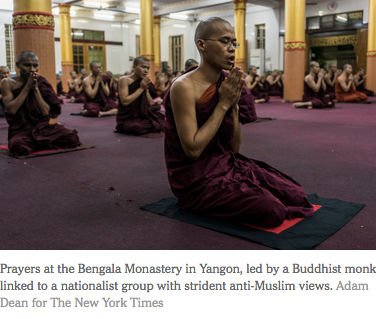YANGON, Myanmar — Nearly a decade into Myanmar’s transition out of military rule, the country’s once-celebrated transition toward democracy is hardening into something very different from what activists and world leaders had hoped for.
Citizens select their leaders, but without the robust institutions or norms like pluralism, universal rights or tolerance necessary for democracy to function.
They express, in surveys and social media, desire for a strongman-style leader and raw majority rule. Democracy, many say, should be guided by religious strictures and nationalism.
The military’s ethnic cleansing campaign against the Rohingya, a Muslim ethnic group, is popular, as are social controls against journalists and minorities.
The civilian state, led by Daw Aung San Suu Kyi, is rapidly centralizing power as checks and balances erode. It is growing oppressive in some areas and weak in others, ceding public space to extremists. Meanwhile, the military still controls important government functions and a perpetual quota of Parliament seats.
The country appears to be converging on a democratic-authoritarian hybrid, formally known as illiberal democracy, which often resembles mob rule. It is a version of majority rule that excludes minorities, curtails freedoms and governs arbitrarily.
“Myanmar’s biggest threat is not the return of dictatorship but an illiberal democracy,” said Thant Myint-U, a historian and former United Nations official.
The country, only a few years into its democracy, is at the outset of a second transition that could be just as consequential.




